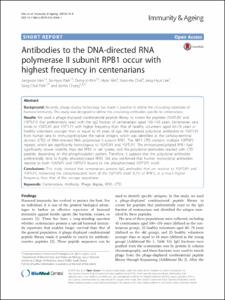Full metadata record
| DC Field | Value | Language |
|---|---|---|
| dc.contributor.author | Han, Jungwon | - |
| dc.contributor.author | Park, So-Hyun | - |
| dc.contributor.author | Kim, Dong-Jo | - |
| dc.contributor.author | Kim, Hyori | - |
| dc.contributor.author | Choi, Yoon-Ho | - |
| dc.contributor.author | Lee, Jong-Hyuk | - |
| dc.contributor.author | Park, Sang Chul | - |
| dc.contributor.author | Chung, Junho | - |
| dc.date.available | 2017-07-11T04:38:43Z | - |
| dc.date.created | 2017-04-10 | - |
| dc.date.issued | 2016-03 | - |
| dc.identifier.issn | 1742-4933 | - |
| dc.identifier.uri | http://hdl.handle.net/20.500.11750/2546 | - |
| dc.description.abstract | Background: Recently, phage display technology has made it possible to define the circulating repertoire of humoral immunity. This study was designed to define the circulating antibodies specific to centenarians. Results: We used a phage-displayed combinatorial peptide library to screen for peptides (YSATLRY and YSPTLFY) that preferentially react with the IgG fraction of centenarians aged 100-105 years. Centenarian sera binds to YSATLRY and YSPTLFY with higher frequency than that of healthy volunteers aged 60-79 years or healthy volunteers younger than or equal to 43 years of age. We prepared polyclonal antibodies to YSATLRY from human sera to immunoprecipitate the native antigen, which was identified as the carboxy-terminal domain (CTD) of DNA-directed RNA polymerase II subunit RPB1. The RBP1 CTD contains multiple YSPTSPS repeats, which are significantly homologous to YSATLRY and YSPTLFY. The immunoprecipitated RPB1 had significantly slower mobility than did RPB1 in cell lysates, and the polyclonal antibodies reacted with CTD peptide, depending on the phosphorylation pattern. Therefore, it appears that the polyclonal antibodies preferentially bind to highly phosphorylated RPB1. We also confirmed that human monoclonal antibodies reactive to both YSATLRY and YSPTLFY bound to the phosphorylated YSPTSPS motif. Conclusions: This study showed that centenarians possess IgG antibodies that are reactive to YSATLRY and YSPTLFY, mimicking the phosphorylated form of the YSPTSPS motif (CTD of RPB1), at a much higher frequency than that of the average population. © 2016 Han et al. | - |
| dc.language | English | - |
| dc.publisher | BioMed Central Ltd. | - |
| dc.title | Antibodies to the DNA-directed RNA polymerase II subunit RPB1 occur with highest frequency in centenarians | - |
| dc.type | Article | - |
| dc.identifier.doi | 10.1186/s12979-016-0064-1 | - |
| dc.identifier.scopusid | 2-s2.0-84962544415 | - |
| dc.identifier.bibliographicCitation | Immunity and Ageing, v.13, no.1 | - |
| dc.description.isOpenAccess | TRUE | - |
| dc.subject.keywordAuthor | Centenarians | - |
| dc.subject.keywordAuthor | Antibody | - |
| dc.subject.keywordAuthor | Phage display | - |
| dc.subject.keywordAuthor | RPB1 | - |
| dc.subject.keywordAuthor | CTD | - |
| dc.subject.keywordPlus | Antibody | - |
| dc.subject.keywordPlus | AUTOANTIBODIES | - |
| dc.subject.keywordPlus | Centenarians | - |
| dc.subject.keywordPlus | CTD | - |
| dc.subject.keywordPlus | PHAGE DISPLAY | - |
| dc.subject.keywordPlus | RPB1 | - |
| dc.subject.keywordPlus | SCLERODERMA | - |
| dc.subject.keywordPlus | SystemIC-SCLEROSIS | - |
| dc.citation.number | 1 | - |
| dc.citation.title | Immunity and Ageing | - |
| dc.citation.volume | 13 | - |
- Files in This Item:
-
 기타 데이터 / 632.73 kB / Adobe PDF
download
기타 데이터 / 632.73 kB / Adobe PDF
download
- Appears in Collections:
- ETC 1. Journal Articles



